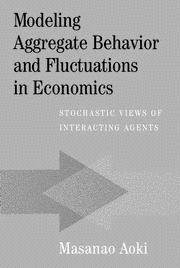Book contents
- Frontmatter
- Contents
- Preface
- 1 Overviews
- 2 Setting Up Dynamic Models
- 3 The Master Equation
- 4 Introductory Simple and Simplified Models
- 5 Aggregate Dynamics and Fluctuations of Simple Models
- 6 Evaluating Alternatives
- 7 Solving Nonstationary Master Equations
- 8 Growth and Fluctuations
- 9 A New Look at the Diamond Search Model
- 10 Interaction Patterns and Cluster Size Distributions
- 11 Share Market with Two Dominant Groups of Traders
- Appendix
- References
- Index
1 - Overviews
Published online by Cambridge University Press: 15 October 2009
- Frontmatter
- Contents
- Preface
- 1 Overviews
- 2 Setting Up Dynamic Models
- 3 The Master Equation
- 4 Introductory Simple and Simplified Models
- 5 Aggregate Dynamics and Fluctuations of Simple Models
- 6 Evaluating Alternatives
- 7 Solving Nonstationary Master Equations
- 8 Growth and Fluctuations
- 9 A New Look at the Diamond Search Model
- 10 Interaction Patterns and Cluster Size Distributions
- 11 Share Market with Two Dominant Groups of Traders
- Appendix
- References
- Index
Summary
Our objectives and approaches
This book is about modeling a large collection of interacting agents, and examining aggregate (deterministic) dynamics and associated stochastic fluctations.
There are two aspects or components in carrying out these objectives: dynamics, and random combinatorial analysis. The former is more or less self-explanatory and familiar to economists, although some of the techniques that are presented in this book may be new to them. The latter involves some facts or results that are rather new in economics, such as obtaining statistical distributions for cluster sizes of agents by types. More will be said on types later.
We regard economic processes as jump Markov processes, that is, continuous-time Markov processes with at most countable state spaces, and analyze formations of subgroups or clusters of agents by types. Jump Markov processes allow us to model group sentiments or pressure, such as fashion, fads, bandwagon effects, and the like. A cluster is formed by agents who use the same choices or decisions. Agents are thus identified with the rules they use at that point in time. Agents generally change their minds – that is, types – over time. This aspect is captured by specifying a set of transition rates in the jump Markov processes. Distributions of cluster sizes matter, because a few of the larger clusters, if and when formed, approximately determine the market excess demands for whatever goods are in the markets. There are some new approaches to firm size distributions as well.
- Type
- Chapter
- Information
- Modeling Aggregate Behavior and Fluctuations in EconomicsStochastic Views of Interacting Agents, pp. 1 - 8Publisher: Cambridge University PressPrint publication year: 2001



